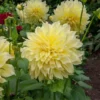NEED SUPPORT WITH YOUR ORDER? Get in touch
Not satisfied with your purchase?
Enter your Order ID on website, and we'll resolve it right away.
Original price was: $19.98.$9.99Current price is: $9.99.
Plant giant yellow dinnerplate dahlia tubers and transform your garden into a vibrant showcase. These magnificent yellow dahlia tubers produce impressive 10-inch blooms, perfect for stunning floral displays and bouquets. Easy to grow for any gardener.
Mar 03
Mar 08 - Mar 10
Mar 13 - Mar 17
USDA Hardiness Zone
Soil Type
Sunlight Exposure
Expected Planting Period
Shipping and return policies: Our Alive & Thrive Guarantee covers issues with your plants within the first 30 days. Get in touch with us via email, and our team will review your concerns and, if necessary, provide you with a one-time replacement at no cost.
If you're unsure about your hardiness zone, feel free to reach out to us. Our team will answer your questions and help you find the plants that are truly suitable for your environment, climate, and personal preferences.
Bring unparalleled sunshine to your garden with giant yellow dinnerplate dahlia tubers. These magnificent flowers, known for their exceptionally large, vibrant yellow blooms, are a true show-stopping addition to any landscape. Each tuber promises to unfurl spectacular blossoms that can reach up to 10 inches in diameter, creating a dramatic focal point in garden beds, borders, or large containers. Cultivating these spectacular blooms is a rewarding experience for any gardener, from novice to expert, offering impressive size and color that will captivate all who see them. Our premium yellow dahlia tubers are carefully selected to ensure vigorous growth and abundant flowering, promising a season filled with stunning floral displays.
These majestic dahlias are not just about size; their rich, golden-yellow hue adds warmth and cheer to any setting. Whether you’re an experienced horticulturist or just starting your gardening journey, these dahlia bulbs for planting are designed for success. They are relatively easy to grow and maintain, provided they receive the right care and attention. Prepare to be amazed as your garden comes alive with the radiant beauty of these exceptional dahlias, drawing admiration from all who visit.
Discover the myriad advantages of incorporating these spectacular dahlias into your outdoor space. From their impressive visual impact to their versatility, these tubers offer a wealth of benefits for any gardener:
Successful cultivation of your giant yellow dinnerplate dahlia tubers begins with proper planting and ongoing care. For best results, plant your tubers outdoors after the last frost in spring, ensuring the soil temperature is at least 60°F. You can also get a head start by beginning tubers indoors 4-6 weeks before the last frost. Choose a sunny location that receives 6-8 hours of direct sunlight daily. A sheltered spot will help protect the large blooms from strong winds. Prepare loose, well-draining, and fertile soil with a pH of 6.5-7.0, enriching it with compost or aged manure for essential nutrients. Dig a hole 4-6 inches deep and lay the tuber horizontally with the “eye” (sprout) facing up. Space tubers 18-24 inches apart to allow for proper airflow and growth. Crucially, do not water immediately after planting; wait until sprouts appear to prevent tuber rot.
Once sprouts emerge, water deeply 2-3 times per week, allowing the top inch of soil to dry out between waterings. Avoid overhead watering to mitigate the risk of fungal diseases. Fertilize every 2-4 weeks with a low-nitrogen fertilizer (such as 5-10-10 or 10-20-20) once the plants are established to encourage abundant flowering over excessive foliage. Staking is absolutely essential for these magnificent plants; their blooms can reach 10 inches wide and easily weigh down stems. Use sturdy supports like bamboo stakes, tomato cages, or a specialized dahlia support system. Pinch the center stem when the plant reaches 12-16 inches tall to promote bushier growth and more blooms. Deadhead spent flowers regularly to encourage continuous flowering throughout the season. Proper care will ensure a continuous display of these magnificent yellow dahlia tubers.
Keep a watchful eye for common pests such as aphids, slugs, and spider mites, treating with insecticidal soap or neem oil if necessary. Good air circulation and avoiding wet foliage are key to preventing powdery mildew. For gardeners in zones below USDA Zone 8, overwintering your dahlias is crucial. After the first frost, cut back stems to about 4 inches above the ground. Carefully dig up the tubers, allow them to dry for a few days in a cool, shaded area, and then store them in peat moss, sawdust, or vermiculite in a cool, dry place (40-50°F) until replanting in spring. This ensures you can enjoy another season of massive yellow blooms year after year. Learning how to grow dinnerplate dahlias successfully is a rewarding endeavor.
These yellow dahlia tubers are carefully packaged and ready for planting, designed to produce impressive plants that typically reach 3-4 feet in height, with an equal spread, creating a substantial presence in your garden. The star attraction, of course, is the bloom size, with individual flowers consistently reaching 8-10 inches in diameter. Each tuber is a dormant root structure, preparing to burst forth with vigorous growth and spectacular flowering beauty once planted. They are shipped ready to plant in your garden or containers.
Expect your dahlias to begin blooming from mid-summer, continuing their vibrant display until the first hard frost. With proper care, these tubers offer a robust growth rate, quickly developing into mature plants that will be the envy of your neighborhood. The substantial size of the blooms makes them ideal for creating dramatic garden focal points and generous, eye-catching cut flower arrangements.
You must be logged in to post a review.
 Original price was: $19.98.$9.99Current price is: $9.99.
Original price was: $19.98.$9.99Current price is: $9.99.
Reviews
There are no reviews yet.